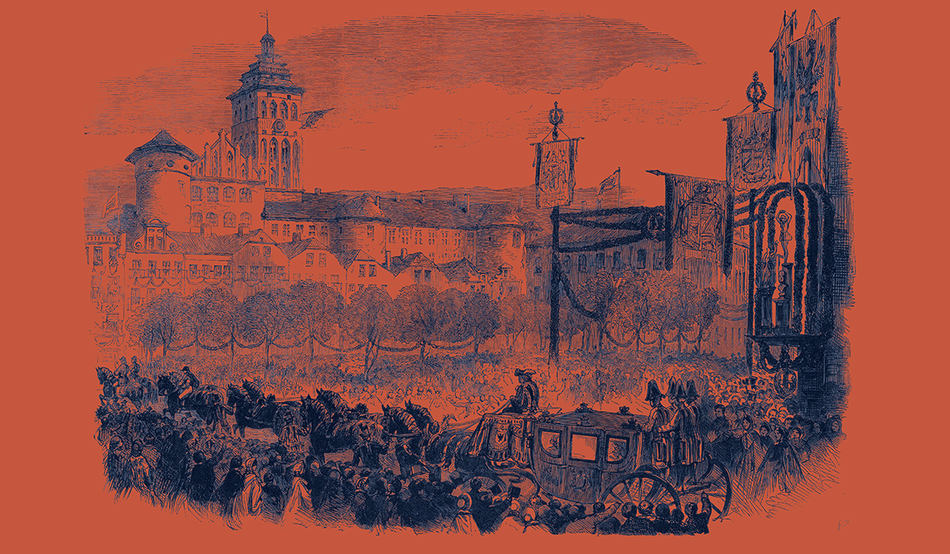Earlier this year, I sat next to the regius professor of history at the University of Cambridge for a literary dinner—and ignored him for most of the evening. I had my reasons, and I still think they were good ones. Because, you see, at my other shoulder was someone heavily involved with the production of the world’s longest-running soap opera—and a bulwark of my life—BBC Radio 4’s The Archers. Here was a rare opportunity to nerd out about the fictional farming village of Ambridge with a true insider, so Christopher Clark, knight of the realm and author of several totemic works of history, including Iron Kingdom and The Sleepwalkers, would have to wait.
And wait he did, until I turned to him with (insincere) apologies towards the end of the evening. “I’m sorry, but I’m sat next to this other person involved with The Archers,” I started… before he immediately cut in, “Ah, The Archers!” Turned out, he is an inveterate listener too. Which left me wishing I’d initiated a conversation between the professor and the producer, myself in between, somewhat sooner.
But at least I’ve been able to make amends since then, in a way. Clark’s latest book, A Scandal in Königsberg, was published earlier this month, and I met him recently outside a pub in Westminster to talk about it. It is, as I tried to indicate in a brief review in the latest issue of Prospect and a longer one for Engelsberg Ideas, a magisterial work—though I perhaps didn’t communicate, in either of those reviews, that it is not entirely removed from The Archers, even if it concerns a religious scandal in 1830s Prussia. As Clark puts it himself, while sipping at a gin & lime & soda that was the result of an ordering mix-up, “It seems to me that a city like Königsberg can be very, very complex. Just as the life of Ambridge is actually quite complex.”
At first, this might seem a puzzling remark from a leading historian: of course Königsberg is as complex as Ambridge. It was, after all, the birthplace of Immanuel Kant, who would go on to start a revolution in thought from the halls of its university. It may even have been the birthplace of Prussia itself, since it was the capital of the original Duchy of Prussia, before that ducal region overspilled its boundaries and took responsibility for much of what is now northern Germany. Even today, with remnants of old Königsberg forming part of the Russian maritime enclave known as Kaliningrad, the city seems many orders more complex than good old Ambridge.
But the Königsberg of Clark’s book is far removed from the Königsberg of Kant’s time. The philosopher is dead, Napoleon has been and gone, and the whole place has a sleepier, more withdrawn aspect. “By the time I’m talking about, the mid-19th century, it had become a very marginal place,” says Clark. “It took about six days, on specially improved roads, to get from Berlin to Königsberg—if you were lucky.”
‘How was this possible in 1830s Königsberg, which has a rather straitlaced reputation?’
And in such out-of-the-way places, drama happens. Clark alighted on the soap-operatic story that gives his book its subject while sifting through Prussian archives decades ago. “I happened across these documents about sectarian activity—in particular, this bunch of files about an ‘evil sect’ in Königsberg,” he recalls. “So I called these files down from the storage depot and started reading. There was hair-raising material about women supposedly dying of excessive sexual arousal. And about two clergymen turning their churches into hubs for this licentious sexual behaviour. I thought: how was this possible in 1830s Königsberg, which has a rather straitlaced reputation? That’s where it all began.”
Which brings us to the cast of A Scandal in Königsberg. The two clergymen Clark mentions were a pair of progressive Lutherans called Johann Ebel and Heinrich Diestel. After helping a young society woman recover from a spiritual slump after the death of her husband, Ebel was “celebrated as a kind of magical doctor,” says Clark, “a Svengali-like figure who could bring people back from the deepest melancholia. He was lionised by the city’s great families and wound up with one of the best positions in the Königsberg church-scape, the post of preacher at the Old City Church.” Diestel, also a preacher and Ebel’s friend, was, by contrast, “more square-jawed, soldierly, choleric… he had anger management issues”.
It was this mix—of the sensitive preacher and the angry one—that, to some extent, led to this particular scandal in Königsberg. But we shouldn’t downplay the role—and could never downplay the name—of Count Finck von Finckenstein, who is perhaps the most terrible baddie, among several others, in the book. It was, after all, von Finckenstein who accused Ebel of operating a kind of sex cult in the first place, in a letter to a female cousin warning her against associating with the preacher. “He wrote to her and said: don’t do that,” paraphrases Clark. “These people are servants of Satan. Two girls have died of actual arousal. This is a place that ruins young women.”
Except that letter made its way to Diestel, who was outraged on Ebel’s behalf—and wrote back to von Finckenstein in stentorian terms. “Suddenly,” Clark continues, “you’ve got this voice of Diestel speaking to Finck and saying ‘I will crush you under my heel, you snake… you miserable lying brat… I curse your split snake-tongue… the words that bubble up from the latrine of your throat…’ So it’s pretty strong stuff, yes.” And actionable stuff, too. Given that insult was, in those days, a crime, von Finckenstein passed Diestel’s letter on to the authorities, who started investigating both preachers and the lurid allegations against them. “The scandal,” Clark says, “begins to gain momentum.”
Several other factors added to that momentum. Prussia’s burgeoning press, for example, which gloried in every prurient detail of the ensuing trials. And also the close-knit nature of Königsberg itself. “It was a small place,” explains Clark, “a place where everybody knew each other, so it was a rather intimate setting. That’s what gives the whole story a slightly soap opera-ish feel; the fact that everybody knew everybody, and, whenever anyone got involved in any scandal, everybody had an opinion about them. The whole city thought as a kind of composite mind about what was going on and divided into different camps.” He smiles, before adding: “A little bit like Ambridge, in fact.”
If a historian’s joy can be said to be infectious, then Clark’s is, outside that Westminster pub. I ask whether he enjoyed working on A Scandal in Königsberg, though I already know the answer. “It was tremendous fun,” he responds, “and sometimes almost unbelievable when you read the stuff people were saying.” He describes the discovery of a letter about von Finckenstein’s own sex life—the good count had a yearning for someone to watch his wife in flagrante delicto, which he later blamed on Ebel—as “one of the best moments” of his research. “I remember I would sometimes just burst out laughing, disturbing the other archival scholars who weren’t expecting anyone to be amused by what they were reading.”
But, as his role at Cambridge university attests, Clark is a serious historian—and, for all its salacious delights, A Scandal in Königsberg is a serious work. “I wouldn’t have written this book,” he says, “if I didn’t think that this story contained some fabular messages about how small societies work, how scandals work and what a force in life self-righteousness can be.” Though, actually, that list is selling the text short. It also covers everything from the rise of religious experimentalism in the wake of the Napoleonic Wars to the horrible dismissal of women’s cares and testimonies.
For all its salacious delights, ‘A Scandal in Königsberg’ is a serious work
Though perhaps its greatest theme is the battle of reason against imagination—as personified by the figure of Theodor von Schön. He was governor of the province of Prussia at the time of the scandal and, even today, is held up as an enlightened figure who defended such modern values as freedom of speech, thought and belief. Except he must have been having an off-day when it came to the Ebel and Diestel case, since he meddled in the trial in favour of their accusers. “I don’t want to take away from him,” claims Clark. “I think he still deserves to be the glowing figure that he is in the historiography. But people ought to remember that there was more to him than just that—as there is more to all of us.”
Or perhaps that is the greatest theme of A Scandal in Königsberg: all of us, humanity itself. In the book’s back matter, Clark acknowledges his debt to his “former doctoral supervisor”, the late historian Jonathan Steinberg, who, among other qualities, demonstrated “a sensitivity to the place or personality and subjective perception in the dramas and conflicts that interest historians”. It is an example that Clark strives to follow. “Jonathan used to say that history is different from physics—our objects talk back to us,” he laughs. “We can decide to work against that, or we can try to integrate those voices into what we write.”
And what became of the two voices, those two people, caught up in this scandal, Johann Ebel and Heinrich Diestel? Let’s just say that there might have been more hypocrisy and jealousy than truth to the accusations against them; though you will have to—should—buy A Scandal in Königsberg for the details. Suffice to say here, as Clark does with the last few sips of his G&L&S, “Once all the energy and outrage had died down, the people who’d done the attacking completely lost interest and moved on as if nothing had happened.”
But something did happen, of course, and it warrants its own soap opera, set in 19th-century Königsberg. Perhaps I should email that Radio 4 producer?













